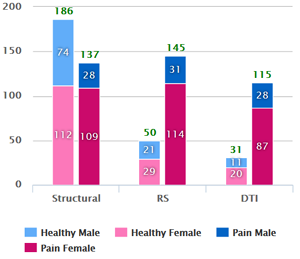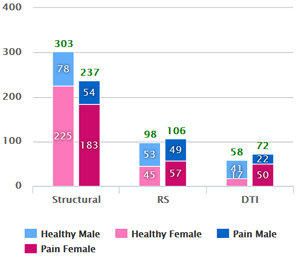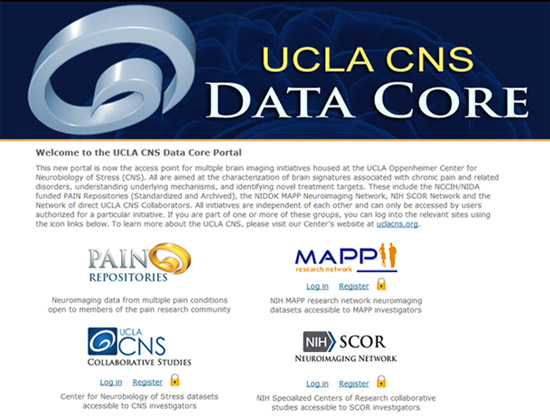PAIN Newsletter 2.2
| Issue 2.2 — Summer 2015 | |
 |
In This Issue
|
| Message from Emeran A. Mayer – Chair, Executive Committee | |
|
Welcome to the fourth issue of the PAIN Repository Newsletter. The Pain and Interoception Imaging Network (PAIN) continues to grow thanks to the efforts of the PAIN support team and the willingness of pain researchers across the world to join this exciting effort. Since the last edition of the newsletter we have added new scans, bringing the total number to 1538. Standardized data repositories have been recognized by the NIH and other funding agencies as an important strategy to lead to a better understanding of the neurobiological architecture and pathophysiology of chronic pain. Our goal is to make the Pain Repositories an important tool for such research efforts which is available to all members. We would like to welcome new members from the National Yang Ming University and The Tai Pei General Hospital in Taiwan; University of California, San Diego; Washington University School of Medicine in St Louis; and the University of Colorado. There has been a minor change in the web portal for the Pain repositories. PainRepository.org remains the direct link to the Pain repositories site, however we also have created a new UCLA CNS Data Core portal which serves as the main hub for accessing multiple brain imaging databases housed at UCLA, including the Pain repositories. Even though these database initiatives can now be accessed from a common portal, each is functionally a separate and independent dataset, and access is restricted to each program’s particular membership. We invite you to visit the new Data Core portal and see the other initiatives and we hope that as some of the data contained in these repositories becomes public, we will be able to fully integrate such data sets into the Pain Repositories. The PAIN Repository currently contains multimodal scans from a large number of healthy control subjects, and from several chronic pain conditions, including low back pain, vulvodynia, IBS, inflammatory bowel disease and migraine headaches. In order to realize the full potential of this repository, I would like to urge members or interested parties to consider uploading more scans from pain conditions already represented in the repositories, or from other pain conditions that are currently under represented, including neuropathic pain, fibromyalgia, and chronic inflammatory pain conditions. We have been in discussions with NIDA and with PAIN members to explore the interest in expanding the metadata collection to include more psychiatric variables (in particular DSM, questionnaires assessing trait and state anxiety and depression) and pain medication use. Another option under consideration is the inclusion of complete datasets from patients with depression and anxiety disorders, with or without pain symptoms. This will enable us to compare brain signatures not only between different chronic pain populations, but also between subjects with a diagnosis of chronic pain and of depression or anxiety disorders. Although the PAIN repositories are relatively new we have already begun to process the first requests for data and look forward to helping members take advantage of the growing resource in the upcoming months. If you haven’t signed up as a member, or if you are a member and have been too busy to upload your existing scans, please contact the PAIN support team or check the PAIN website. |
|
| News Bites | |

The UCLA CNS Data Core The PAIN repository is one of several collaborative research initiatives of the CNS Data Core hosted by the UCLA Center for Neurobiology of Stress (CNS). Each research initiative is independent with its own user group, governance, funding and data security. However, we have recently updated the CNS Data Core portal to highlight these various collaborations and allow for a single access point to all. Our Site’s New Look The new UCLA CNS Data Core Portal is the main hub for accessing multiple brain imaging collaborations:
 The Pain and Interoception Imaging Network (PAIN) provides an infrastructure for storage of multimodal neuroimaging, clinical and behavioral data from multiple pain conditions. The Pain and Interoception Imaging Network (PAIN) provides an infrastructure for storage of multimodal neuroimaging, clinical and behavioral data from multiple pain conditions. MAPP is a multidisciplinary, multisite network focusing on urological chronic pelvic pain. MAPP key areas of interest are disease biomarkers, epidemiology, phenotyping of urological and non-urological symptoms, neuroimaging, neurobiology and the characterization of pain pathways. MAPP is a multidisciplinary, multisite network focusing on urological chronic pelvic pain. MAPP key areas of interest are disease biomarkers, epidemiology, phenotyping of urological and non-urological symptoms, neuroimaging, neurobiology and the characterization of pain pathways. The UCLA Center for Neurobiology of Stress houses multiple collaborations with research partners all over the world. These datasets are available to qualified CNS investigators.  The NIH Specialized Centers of Research (SCOR) network provides interdisciplinary opportunities for studying sex differences that affect women’s health.
The UCLA CNS Data Core is funded by National Institutes of Health, NIDDK, NCCIH, NICHD and NIDA. New PAIN Dataset Released PAIN Collaborators Qasim Aziz, Matt Howard, Steve Williams and Daniel Keszthelyi have requested and received their first Pain Repository dataset comprised of 106 MRI subjects for a new Irritable Bowel Syndrome analysis. |
|
| Current Data | |
|
Our growing body of data contains structural and functional brain scans from patients with chronic pain conditions and healthy controls contributed by members and available for analysis.In addition, the PAIN Standardized Repository also offers clinical, psychosocial and behavioral data. The Executive Committee evaluates all requests for data, and encourages collaborations among multiple researchers and institutions. Current pain conditions include: chronic back pain (CBP), fibromyalgia (FM), migraine, irritable bowel syndrome (IBS), vulvodynia (Vlvd), inflammatory bowel disease (IBD) |
|
|
Standardized Repository Standardized Structural Scans: 323 Standardized Resting State Scans: 195* Standardized DTI Scans: 146* Total Standardized Scans: 664 |
 |
|
Archived Repository Structural Scans: 540 Resting State Scans: 204* DTI Scans: 130* Total Archived Scans: 874 |
 |
| * All requested resting state and DTI scans will be accompanied by a structural scan for co-registration. Standardized resting state and DTI scans may be accompanied by a structural scan not acquired using standardized parameters but meets the needs for co-registration. | |
| Funding Opportunities | |

The National Institutes of Health (NIH) is currently offering funding opportunities that can benefit pain researchers.
|
|
| Recent Relevant Publications | |

Pain and Interoception Imaging Network (PAIN): A multimodal, multisite, brain-imaging repository for chronic somatic and visceral pain disorders Labus JS, Naliboff B, Kilpatrick L, Liu C, Ashe-McNalley C, Dos Santos IR, Alaverdyan M, Woodworth D, Gupta A, Ellingson BM, Tillisch K, Mayer EA Neuroimage. 2015 Apr 19. pii: S1053-8119(15)00308-0. doi: 10.1016/j.neuroimage.2015.04.018. The paper presents the Pain and Interoception Imaging Network (PAIN) Repository, a multimodal neuroimaging archive comprised of two databases; the PAIN Standardized and the PAIN Archived repositories. The primary goal of the PAIN Repositories is to foster inter-site collaborations, promote pain research opportunities and facilitate the creation of robust grant proposals. |
|
| Call for Papers/Upcoming Conferences | |
|
ICPMM 2016 18th International Conference on Pain Medicine and Management
May 23-24, 2016 – London, United Kingdom Deadlines: Paper submission: November 5, 2015 The ICPMM 2016 invites researchers and academic scientists to share their experiences with different aspects of pain medicine and management. Specific areas of interest include pain syndrome, chronic and acute pain management, pain relief therapies, and evaluation of the pain patient among others.
9th Interdisciplinary World Congress on Low Back & Pelvic Girdle Pain October 31 – November 3, 2016 – Singapore Deadlines: Paper submission: December, 20, 2015 The aim of the 9th Interdisciplinary World Congress on Low Back & Pelvic Girdle Pain is to promote interdisciplinary knowledge regarding the diagnosis, management and prevention of both chronic and acute lumbopelvic pain. Areas of interest range from neuro-surgery, medicine, orthopedics, osteopathy to biomechanics and physiotherapy. Learn more |
| PAIN Repository FAQ – New Additions | |||||||||||||||
| Q | Who can request PAIN Repository data? | ||||||||||||||
| A |  Any investigator who contributed data to the PAIN Repository can request PAIN datasets. PAIN Standardized Repository members are eligible to request both Archived and Standardized Data. Contributors to the Archived repository can request Archived datasets. Any investigator who contributed data to the PAIN Repository can request PAIN datasets. PAIN Standardized Repository members are eligible to request both Archived and Standardized Data. Contributors to the Archived repository can request Archived datasets. |
||||||||||||||
|
|||||||||||||||
| The Oppenheimer Center for Neurobiology of Stress at UCLA CHS 42-210 MC737818 10833 Le Conte Avenue Los Angeles, CA 90095-7378 Phone: (310) 206-0192 info@painrepository.org |
|||||||||||||||

